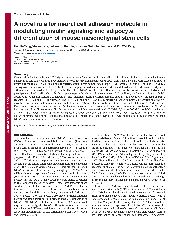摘要
Neural cell adhesion molecule (NCAM) has recently been found on adult stem cells, but its biological significance remains largely unknown. In this study, we used bone-marrow-derived mesenchymal stem cells (MSCs) from wild-type and NCAM knockout mice to investigate the role of NCAM in adipocyte differentiation. It was demonstrated that NCAM isoforms 180 and 140 but not NCAM-120 are expressed on almost all wild-type MSCs. Upon adipogenic induction, Ncam(-/-) MSCs exhibited a marked decrease in adipocyte differentiation compared with wild-type cells. The role of NCAM in adipocyte differentiation was also confirmed in NCAM-silenced preadipocyte 3T3-L1 cells, which also had a phenotype with reduced adipogenic potential. In addition, we found that Ncam(-/-) MSCs appeared to be insulin resistant, as shown by their impaired insulin signaling cascade, such as the activation of the insulin-IGF-1 receptor, PI3K-Akt and CREB pathways. The PI3K-Akt inhibitor, LY294002, completely blocked adipocyte differentiation of MSCs, unveiling that the reduced adipogenic potential of Ncam(-/-) MSCs is due to insulin resistance as a result of loss of NCAM function. Furthermore, insulin resistance of Ncam(-/-) MSCs was shown to be associated with induction of tumor necrosis factor alpha (TNF-alpha), a key mediator of insulin resistance. Finally, we demonstrated that re-expression of NCAM-180, but not NCAM-140, inhibits induction of TNF-alpha and thereby improves insulin resistance and adipogenic potential of Ncam(-/-) MSCs. Our results suggest a novel role of NCAM in promoting insulin signaling and adipocyte differentiation of adult stem cells. These findings raise the possibility of using NCAM intervention to improve insulin resistance.
- 出版日期2011-8-1
- 单位南阳理工学院
